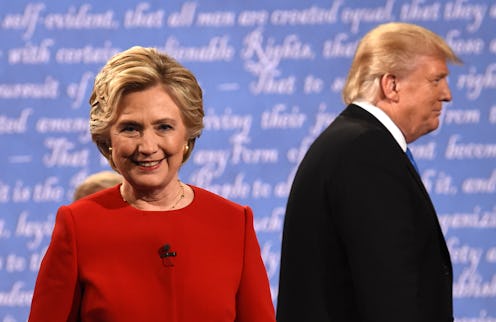News
Hillary Clinton Might Challenge Trump’s Win If There’s Proof Russia Stole The Election

Former Democratic presidential candidate Hillary Clinton might challenge Trump's presidential victory if more evidence of Russian interference becomes public, she said during an interview with NPR's Terry Gross.
Now, to be clear, this would create an extremely uncertain situation ― as the New York Daily News notes, Clinton even acknowledged that she's not aware of an official way to challenge the result of a presidential election so long after the votes have been counted and the result has already been certified. Still, it is nonetheless noteworthy that Clinton refused to rule it out.
In fact, Gross first asked the question, then gave Clinton a second chance to walk back the remark if she so desired. She didn't, however, which set both the mainstream media and social media abuzz with reaction.
You can listen to the full interview here.
Embedded below is the exact exchange between Clinton and Gross, which bears reading closely, given the hugely incendiary nature of what's being discussed. In particular, Gross was not specific about what sort of new information regarding Russian interference in the election might make Clinton question the legitimacy of the election, which means Clinton could've been considering the sorts of possibilities that really would merit a massive reaction — for instance, purely as an example, if evidence emerged that vote totals were tampered with in the battleground states she lost.
"Would you completely rule out questioning the legitimacy of this election if we learn that the Russian interference in the election is even deeper than we know now?" Gross asked.
"No, I would not," Clinton replied. "No, I wouldn't rule it out."
Clinton went on to acknowledge the uncertainty in what that would entail, referring to the recent overturned election in Kenya as a point of reference, and also asserting a connection between that recently overturned Kenya election, the Brexit campaign in Britain, and the Trump campaign she faced last year.
I don't believe there are. There are scholars, academics, who have arguments that it would be, but I don't think they're on strong ground. But people are making those arguments. I just don't think we have a mechanism. You know, the Kenya election was just overturned and really what's interesting about that — and I hope somebody writes about it, Terry — the Kenyan election was also a project of Cambridge Analytica, the data company owned by the Mercer family that was instrumental in the Brexit vote.
It's undeniably a peculiar role-reversal since around this time last year, when plenty of political observers both assumed Clinton was going to win the presidency, and furthermore feared how Trump might react if that happened. So thick was the concern that he might refuse to concede, or concoct some sort of conspiracy theory to explain away his loss, in fact, that he was asked point-blank during one of the debates whether he'd accept the outcome. His answer was memorable, to say the least.
I'll keep you in suspense, ok?
However, amid the current, ever-escalating scrutiny of Russia's widely alleged role in the 2016 race, Clinton is the one publicly toying with the idea of calling Trump's legitimacy as president into question. This is, without a doubt, a sore spot for Trump ― from the size of his inaugural crowds to the margin of his electoral college victory to his popular vote loss, he's demonstrated some seeming insecurity when it comes to challenges to his legitimacy.
It's incredibly important to note that as it stands, no evidence has been publicly revealed that any votes were actually changed or tampered with last year. Still, there have been a series of worrisome revelations and reports that suggest the U.S. voting infrastructure was penetrated by Russian hackers to a greater extent than once believed. A Bloomberg report in June, citing three sources close to the investigation into the matter, alleged that voting systems in a staggering 39 different states were compromised by Russian hackers.